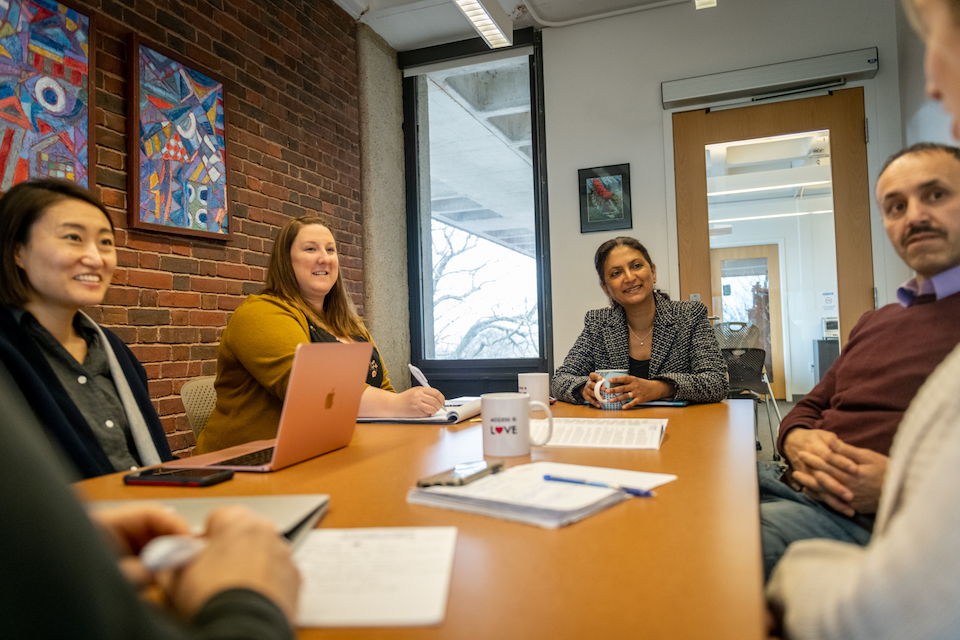Brandeis punches above its weight in social science research
 Photo/Linderpix
Photo/LinderpixResearchers from the Heller School's Lurie Institute for Disability Policy in discussion.
The bottom line: Brandeis University is a leading institution when it comes to research in the social sciences, according to data from the National Science Foundation.
The data, released as part of an annual report from the NSF, shows that Brandeis ranked 17th in the country in funding social sciences research in 2020-21. In all, $34.3 million was invested in social sciences research at Brandeis in the 2020-21 fiscal year.
The natural, mathematical, and computational sciences and engineering comprised over 75 percent of the $89.7 billion in research expenditures by higher education institutions across the country in fiscal year 2021, and social sciences just 3 percent. Brandeis’ ranking in social science research expenditures puts it beside research powerhouses including the University of Michigan; the University of Wisconsin; the University of California, Berkeley; UCLA; USC; Harvard; Duke and the University of Pennsylvania.
“As a modestly sized and young institution, Brandeis’ annual research expenditures cannot compete with those at the largest research universities, with far larger faculties and vast expenditures in medical and engineering research," said Steven Karel, vice provost for research at Brandeis. “Brandeis has had to make strategic decisions about choosing research areas to focus on where it can compete effectively. Historically, one such area was social science and especially social policy. To see Brandeis ranked so highly in a report shows that we can continue to produce high quality research and attract sponsored funding. It should be a real point of pride across campus.”
The social sciences ranking includes spending on research projects in the Division of Social Sciences and the Heller School for Social Policy and Management. It includes grants and contracts from government agencies and private foundations, as well as external scholarship support, and funding from internal university sources.
The Heller School for Social Policy and Management is home to nine world-class research centers and institutes – specializing in health policy; behavioral health; economic and racial equity; disability policy; child, youth and family policy, and more. There were 163 active research projects at Heller last fiscal year, including work funded by the CDC, the U.S Department of Justice, and the Centers for Medicare and Medicaid Services; private foundations, including the W.T. Grant Foundation and W.K. Kellogg Foundation; as well as multilateral organizations like the United Nations Development Program and USAID.
“Every day, researchers at the Heller School are working towards solving challenging problems and bringing new issues – and new solutions – to light,” said Maria Madison, interim dean of the Heller School. “It is this work that is the result of the profound investments in the social sciences at Brandeis that are reflected in this report from the NSF.”
The Division of Social Sciences in the School of Arts and Sciences at Brandeis spans 19 departments and programs with dozens of active faculty-led research projects that receive funding from organizations including the National Science Foundation, National Institutes of Health, National Endowment for the Humanities, Alfred P. Sloan Foundation, John Templeton Foundation and more.
“At Brandeis, excellence in the classroom and excellence in research feed off each other,” said Charles Golden, professor of anthropology and head of the Division of Social Sciences. “Our faculty are leaders in their field, performing groundbreaking and unique research, and students benefit from that in classrooms, labs, internships, and fieldwork.”
The data was part of the report for the NSF’s Higher Education Research and Development Survey, the primary source of information on research and development expenditures at U.S. colleges and universities. The survey collects information on expenditures by field of research and source of funds, along with information on types of research, expenses, and personnel.
Categories: Humanities and Social Sciences, Research





